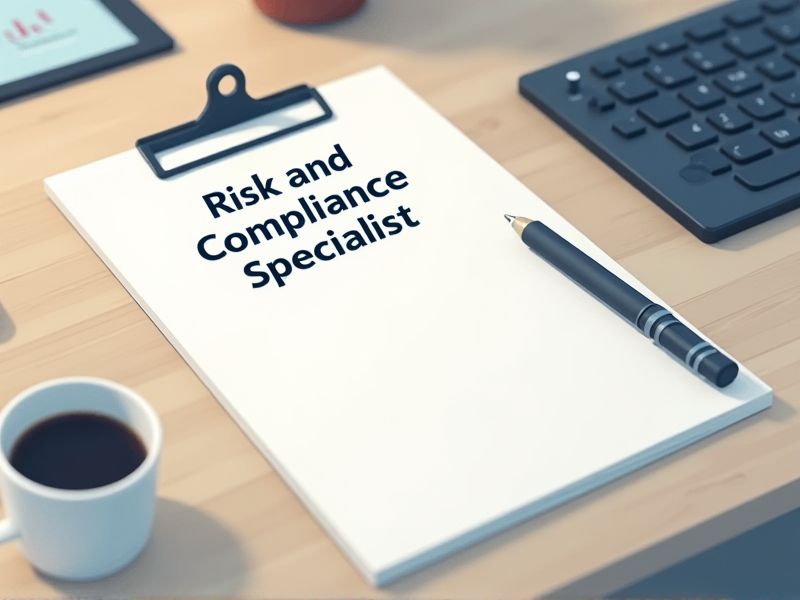
Risk and Compliance Specialists play a crucial role in ensuring organizations adhere to regulatory standards and manage potential threats effectively. Possessing certain certifications validates their expertise, reinforcing their capability to identify, assess, and mitigate risks efficiently. Certifications provide the necessary framework to stay updated with evolving laws and standards, enhancing credibility and trust. Some important certifications you may need for a Risk and Compliance Specialist include CCEP, CRISC, CISSP, and CAMS.
Certified in Risk and Information Systems Control (CRISC)
Certified in Risk and Information Systems Control (CRISC) is pivotal for Risk and Compliance Specialists because it enhances their ability to identify and evaluate IT risks. This certification equips professionals with the necessary tools to implement effective information system controls. The knowledge gained through CRISC supports the alignment of IT priorities with the company's risk management strategy. Employers often value and seek CRISC-certified individuals for mitigating potential operational threats and ensuring regulatory compliance.
Certified Regulatory Compliance Manager (CRCM)
When a Risk and Compliance Specialist possesses the Certified Regulatory Compliance Manager (CRCM) credential, their understanding of complex compliance frameworks enhances significantly. This advanced training fosters the ability to proactively identify and address regulatory risks, reducing potential legal issues for the organization. The CRCM certification assures employers of the specialist's commitment to upholding industry standards and maintaining up-to-date compliance knowledge. As regulatory environments become more stringent, CRCM-certified specialists offer valuable expertise in navigating these challenges effectively.
Certified Compliance & Ethics Professional (CCEP)
The CCEP certification provides comprehensive knowledge of regulations and ethical standards, critical for a Risk and Compliance Specialist to identify potential compliance gaps effectively. By earning this certification, professionals are equipped with the tools and frameworks necessary to develop robust compliance programs, mitigating organizational risk. It establishes credibility and demonstrates commitment to ethical practices, enhancing trust among stakeholders and regulators. The certification ensures that specialists are up-to-date with evolving compliance laws, thus safeguarding the organization from potential legal and financial repercussions.
Certified Information Systems Auditor (CISA)
The CISA certification equips a Risk and Compliance Specialist with essential expertise in auditing, control, and security of information systems, leading to more effective risk management. Possessing a CISA demonstrates a professional's commitment to understanding the critical components of IT governance, which enhances trust in the organization's compliance processes. This certification ensures that the specialist is well-versed in identifying vulnerabilities, which directly reduces the risk of security breaches. By having thorough knowledge in risk assessment provided by the CISA, the specialist can implement robust compliance strategies that align with industry standards and regulatory requirements.
Financial Risk Manager (FRM)
Businesses face increasingly complex financial markets, leading to evolving types of financial risk that require expert management. The Financial Risk Manager (FRM) provides deep insights into market, credit, and liquidity risks, equipping organizations with strategies to mitigate potential financial losses. Regulatory environments demand rigorous compliance, and an FRM's expertise ensures that a company's strategies align with these regulations. Risk and compliance specialists utilize the analytical skills and comprehensive risk assessments provided by the FRM to strengthen overall financial health and stability.
Certified Fraud Examiner (CFE)
Having a Certified Fraud Examiner enhances a Risk and Compliance Specialist's ability to identify and mitigate fraud risks effectively. A CFE brings specialized knowledge in fraud prevention and detection, which bolsters compliance programs and risk management initiatives. Companies with CFEs can more efficiently navigate complex regulatory environments and reduce potential legal and financial penalties. The presence of a CFE in the team elevates the organization's credibility and trustworthiness among stakeholders.
Certified Internal Auditor (CIA)
The demand for a Certified Internal Auditor (CIA) arises because it validates expertise in internal auditing, a core component of risk management. A CIA provides a standardized approach to evaluating and improving risk management processes within an organization. This certification ensures that the Risk and Compliance Specialist is equipped with the skills necessary to assess potential threats and establish robust compliance frameworks. Companies benefit from this credential as it enhances trust and accountability, leading to more effective governance and operational efficiency.
Certified Information Privacy Professional (CIPP)
Certified Information Privacy Professional (CIPP) certification provides a comprehensive understanding of global privacy laws, which is essential for risk and compliance specialists in aligning with regulatory requirements. As privacy concerns escalate, possessing CIPP certification equips specialists with the necessary tools to proactively manage and mitigate data privacy risks. Data protection laws, such as GDPR and CCPA, require a nuanced comprehension that CIPP certification supports, ensuring organizations adhere to legal obligations. Having CIPP-certified professionals fosters trust and credibility with stakeholders, reducing potential legal and reputational risks.
PMI Risk Management Professional (PMI-RMP)
A PMI Risk Management Professional (PMI-RMP) credential enhances a Risk and Compliance Specialist's ability to identify and evaluate risks effectively. Holding this certification indicates mastery in developing strategic risk responses, essential for safeguarding project objectives. Organizations increasingly demand PMI-RMP certified professionals to ensure rigorous risk mitigation, aligning with industry standards. The specialized skills gained through PMI-RMP training facilitate more accurate risk assessments and improved informed decision-making.
ISO 31000 Risk Management Certification
The ISO 31000 Risk Management Certification provides a structured framework for identifying and mitigating risks, aligning with best practices that enhance a Risk and Compliance Specialist's effectiveness. Organizations expect specialists to possess a robust understanding of international risk management standards, which this certification ensures. Possessing this certification can increase credibility, making specialists more attractive candidates for employers looking for expertise in risk strategies. Certification ensures ongoing professional development, keeping specialists updated on evolving risks and regulatory requirements.
Summary
With certifications, you enhance your understanding of regulatory frameworks, solidifying your expertise in risk management and compliance. You become more adept at identifying potential risks, leading to more effective mitigation strategies. The certifications also elevate your professional credibility, opening up opportunities for career advancement. As a result, organizations benefit from your improved skills, potentially reducing compliance violations and associated costs.
